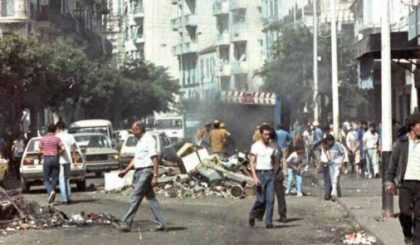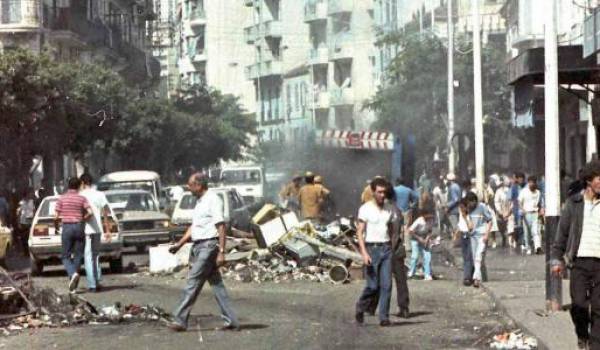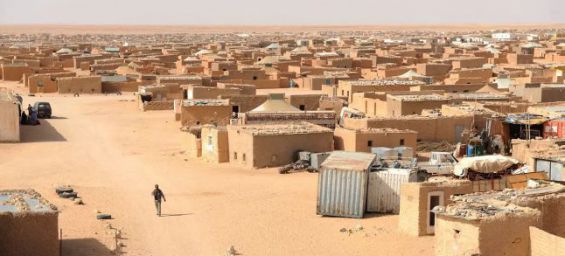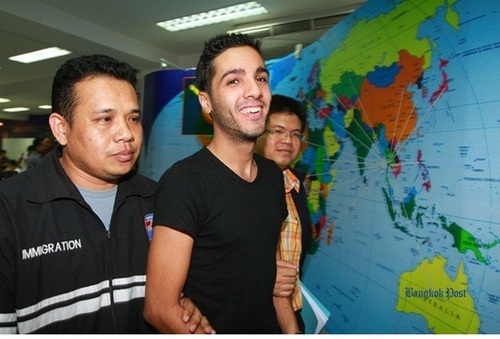 The North Africa Post has been closely following the economic crisis in Algeria as it slowly unfolds in the wake of the oil price slump. Several articles have been published drawing attention to the omens of economic, social and political instability in Africa’s largest country. Today, grim prospects have become more starkly apparent than ever.
The North Africa Post has been closely following the economic crisis in Algeria as it slowly unfolds in the wake of the oil price slump. Several articles have been published drawing attention to the omens of economic, social and political instability in Africa’s largest country. Today, grim prospects have become more starkly apparent than ever.
The dip in oil prices was the spark revealing serious cracks in the Algerian edifice. The combustible mix of unemployment, endemic corruption, inflation, time buying measures instead of structural reforms, restive south, residual terrorism and uncertain political future has put Algeria on the edge of implosion.
Collapsing Social Peace
Low wages, rising inflation and poor working conditions ignited the discontent of doctors and teachers who have been protesting for months and waging strikes that left the health and education sectors paralyzed. Talks between the unions representing doctors and teachers on the one side and the government on the other side failed to reach a breakthrough after months of strikes.
The doctors demanding better wages and healthy working conditions now threaten a collective resignation as talks with the government on March 12 failed to reach consensus.
In the education sector, 4000 striking teachers were sacked. Meanwhile more than 30,000 teachers are waging an open strike demanding housing, health services, zone bonus and better retirement pensions. 80% of Algerian high-schools are affected by the strike with students facing the specter of a lost year.
As state coffers continue to be drained, Algerian Prime Minister Ahmed Ouyahya said the state can no longer sustain the funding of primary schools.“The state of finances in our country does not help us address all requests to improve school conditions in primary schools,” Ouyahya told MPs recently.
While imposing budget cuts affecting the education sector, Algeria maintained its lavish spending on defense to which it earmarked 25% of its 2018 budget, that is equivalent to $10.4 billion.
The Stockholm International Peace Research Institute (SIPRI) said in its latest report released this week that Algeria is by far the largest weapons buyer in Africa, accounting for 52 per cent of all African imports in 2013–17.
Riots Against Backdrop of Soaring Unemployment
Spiking unemployment hit levels threatening of social implosion. Actually, unemployment remains particularly high among the youth, reaching 26.7%. Youth in marginalized areas away from the urban centers have disproportionately borne the brunt of the static labor market.
Riots have regularly took place in the oil and gas rich southern towns over economic marginalization and inadequate public investment. The recent violent riots over tax hikes in the historically rebellious region of Kabylie, notably in the large coastal city of Bejaia highlight the risks for Algerian authorities from altering its subsidy system in a country where social peace hinges on the distribution of oil rent through subsidizing key commodities.
Time-Buying Measures
As it heads straight to insolvency, Algeria insists on shunning foreign debt as it resorts to unconventional measures involving the Central Bank money printing to delay an impending bankruptcy in the absence of genuine reforms.
The Algerian government is implementing time-buying measures known as “helicopter money”. The term was coined by economists to describe the Central Bank covering of the state’s budget deficit by printing more money and injecting it directly into the Treasury, instead of borrowing from abroad.
Since the oil plunge started three years ago, Algeria sought to reduce its tremendous budget deficit internally, by tapping in its foreign exchange reserves, nearly depleting its sovereign wealth fund, known as the Revenue Regulation Fund, and trying to issue bonds to its citizens and commercial sector.
Algeria’s foreign exchange reserves are expected to drop to $85 billion at best by the end of 2018 down from $194 billion in 2014, barely enough to cover 18 months of imports.
To shore up state finances and fend off an impending crisis that will see the state resort to foreign debt, Algeria announced plans to reform its subsidy system, which covers almost everything from basic foodstuffs and drugs to energy.
And the Algerian parliament has taken the unpopular decision of cutting gasoline and diesel subsidies for the third as part of the 2018 budget in an attempt to compensate for dwindling state revenues against the backdrop of staggering oil prices in international markets.
The government has also taken measures to restrict imports of 250 goods, such as cars, some food products and raw materials. It targeted a reduction of $15 billion this year.
However, analysts see the government’s import restriction policy as doomed to fail due to the lack of domestic production.
Importers are warning that limiting imports on vital products such as medicine will result in serious shortages.
Corruption & Regime Opacity Impede Genuine Economic Reforms
The Algerian government released its 2030 vision for economic development, dubbed “New Growth Model,” meant to attract investments to compensate for the collapse in oil prices.
However, the proposed reforms in the new economic growth model seem to ignore the widespread corruption that affected almost all large-scale projects in Algeria.
Algeria’s flagship development project, the East-West Highway, fell victim to the national malaise. Originally allocated a budget of $6 billion, rampant graft saw the project eventually completed for a price of almost $15 billion, making it mile for mile the most expensive road in the world.
Algeria’s ailing President, who took power in 1999, failed to oversee genuine reform that could have achieved a diversification of the Algerian economy away from oil and gas, which represent 98% of total exports. 19 years after he took office, Algeria faces the same dilemma of the beginning of the 1990s when the country depleted its reserves and had to resort to foreign debt before plunging into a decade of devastating civil war.
Instead of blaming the current crisis on a lack of reform during the era of expensive oil, Bouteflika and his cronies rather ascribe the crisis to external factors triggering a “severe decrease” of revenues and necessitating “reforms” that should “be accepted by citizens”.
The superficial nature of the reforms that aim at polishing the façade is similar to the regime’s democratic façade where a group with vested interests in maintaining the authoritarian status quo and rent economy maintain a firm grip on the government machinery by ruling without actually governing.
In the Doing Business Index, Algeria was ranked 166th along with war-torn countries where business is fraught with all sorts of risks. The business climate in Algeria was comparable with conflict-stricken countries such as Iraq (168th), Syria (174th) and Libya (185th). The country came far behind Egypt (128th) and Tunisia (88th).
Algeria was ranked among the ten worst performing countries in the 2018 Economic Freedom Index, established by The Heritage Foundation, an American public policy think tank based in Washington, DC.
The perception of Algeria’s unfriendliness towards foreign investors is worsened by recent investment reforms that left unchanged a rule requiring 51% of national ownership of any projects.
The 51/49 rule provides that at least 51% of the shares of Algeria-based companies must be owned by Algerian nationals residing in Algeria or by companies, which are wholly owned by Algerian resident shareholders.
The archaic banking system has also been pushing investors away. Algeria’s banks remain state-dominated and highly corrupt thus thwarting foreign direct investments.
The political instability and the uncertainty surrounding the successor to the ailing president Bouteflika also contribute to undermining the flow of foreign direct investments, badly needed to diversify the economy.
Some analysts argue that Algeria’s attempts at diversifying the economy have failed because of a lack of clear-sighted strategy to prompt the private sector and attract foreign direct investments.
Falling Oil & Gas Reserves
Algeria’s oil and gas producing capacity is shrinking every year. The government tried to buy time by prospecting new oil and gas reserves in 2016. State-owned energy firm Sonatrach claimed to have discovered 32 new potential exploration zones, most of them are new fields of shale gas whose exploitation is unsustainable in view of the lack of water resources needed to undertake hydraulic fragmentation.
International Think Tanks have been worrying in recent years over Algeria’s declining gas production coupled with a surge in domestic consumption.
Since 2007, Algeria’s consumption of oil and natural gas has risen by more than 50 percent while its oil production has fallen by 25 percent. With less oil available for export, the government’s revenues have been hit hard, Stratfor consultancy said in a report on Algeria’s economic prospects.
According to estimates, the North African country will be a net gas importer of LNG in two decades, warned the former Algerian energy minister Nourdine Ait-Laoussine.
In May 2017, the Oxford Institute for Energy Studies issued a report entitled Algerian Gas: Troubling Trends, Troubled Policies. The document points out to the depletion of Algerian gas and the declining export capacity. “Algeria would be left with only 15 bcm/year to export by 2030. In a lower production or high demand scenarios, it will cease exporting all together, therefore importing gas beyond any such a point,” said the report.”
By the end of Bouteflika’s fourth mandate in 2019, the country will have spent $1000 billion in 20 years, thanks to non-renewable sources. This huge resource could have financed all the development needs of the African continent. Instead of being invested in developing Algeria, these colossal hydrocarbon revenues were used to entrench the authoritarian status quo creating propitious conditions for a looming destructive chaos.



